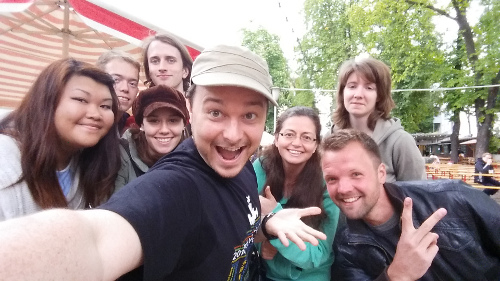How Do You Get Spoken Practice in a Less Common Language?

How do you get language practise when native speakers are genuinely hard to come by?
Simple idea, but very effective: Find other learners
My friend Brandon initially had this very issue with his project to learn Icelandic. It’s a country of just 300,000 people, and they are not so likely to be on language learning sites that offer free exchanges, since their English is already likely to be very good.
Brandon tried to find natives to practise with, but hit a brick wall no matter where he went.
And then he tried something else – he searched instead for other non-native learners of the same language. The numbers suddenly went up dramatically! He had his pick of dozens of people he could Skype for practise. Maybe they didn’t grow up speaking the language, but while Brandon needed to get momentum he could speak with people who were at the same level as him or much higher.
It turns out the Internet has quite a lot of high level Icelandic speakers, willing to help you out!
My own story: Learning Spanish from anyone but Spaniards
The way I learned my first foreign language successfully, long before Skype, actually relies on the same principle, even though the lack of native speakers wasn’t the problem (I was living in Spain after all). It’s that they spoke too fast and used phrasing that was too complicated for me.
I actually learned the majority of my Spanish (initially) from French, Brazilian, Italian and German students who were also learning the language (they were living in Spain as part of the Erasmus student exchange program). They were more likely to speak slowly to me, and as fellow learners they knew the words I was more likely to know, and could rephrase things simpler than a native speaker could.
In fact, native speakers can sometimes be terrible at helping you learn their language if they don’t have teaching experience. They may not know why a term is phrased a particular way – and may not be aware of how complicated something is from the learners’ perspective.
This is definitely true in Spain. No matter how many times you tell many Spaniards to speak slowly, they will not realize they are doing it. It’s discouraging for an absolute beginner!
Try to get practice with those the same level as you or higher

With all this being said, you still need a good strategy when choosing who you practice with. As a beginner, I would be very flexible for languages that are quite restricted in finding speakers online, because any practice is better than no practice. And remember: you are practising and not studying. Imperfection is to be embraced. 😉
The great thing about being a beginner is that pretty much everyone with any experience knows (a little or a lot) more than you do, so everyone can be your teacher!
For instance, are you learning Irish, or Cherokee, or Quechua, or Maltese? These are languages that may have their fair share of native speakers, but they can be notoriously hard to pinpoint in person and even through online practice (Don’t forget that you can listen to them through streamed radio, and read articles in these languages online easier than you think)
But once you cast your net wider and include fellow learners – the world is your oyster! Use the language option on italki (and untick native speaker), or select it as a language they speak on Couchsurfing for in-person meet-ups, or use any other language or social site and search for speakers and be flexible and you may even get better practice than you would with a native, as a beginner.
You can also get in touch with groups of fellow learners on sites like Meetup.com, or find learners in other ways, such as those who came to my book signings, who got loads of language practice with one another, as you can see in the photo (At Word bookstore in New York City)!
This approach of practising with non-natives is of course how people can consistently practice languages like Latin, Klingon, Esperanto and other special interest languages!
And of course, you do this so that when you do get time with a native (if you can find them), you can truly take advantage of it thanks to all that practice you’ve gotten in advance.



Social